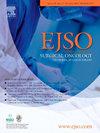Extracapsular tumor spread does not influence survival outcomes in resected N1-patients with intrahepatic cholangiocarcinoma– a retrospectively controlled cohort study
IF 3.5
2区 医学
Q2 ONCOLOGY
引用次数: 0
Abstract
Background
Extracapsular tumor spread (ECS) in lymph nodes is a known predictor of recurrence and decreased survival across various malignancies, including breast and head and neck cancers. However, its prognostic value in patients with intrahepatic cholangiocarcinoma (iCCA) undergoing curative surgery has not yet been explored.
Methods
A retrospective cohort study was conducted, including all patients with lymph node-positive disease (N1) who underwent curative resection for iCCA between 2008 and November 2023. Patients were followed up for at least one year postoperatively. Cases with ECS-positive lymph nodes (N1/ECS+) were compared to those without extracapsular tumor infiltration (N1/ECS-). Statistical analyses included the T-test for continuous variables and the Chi-square test for categorical variables. Survival outcomes were evaluated using the Kaplan-Meier method.
Results
70 patients with N1 disease following potentially curative resection were included. Baseline characteristics were comparable between groups (N1/ECS + n = 30, N1/ECS- n = 40), with no significant differences in age (p = 0.853), resection type (p = 0.511), T-stage (p = 0.785), resection margins (p = 0.687) or the number of tumor-positive lymph nodes (p = 0.052). The median overall survival (OS) was 17.2 months in the N1/ECS + group and 17.3 months in the N1/ECS- group (p = 0.466). Similarly, recurrence-free survival (RFS) was not significantly different, with a median of 4.4 months for N1/ECS + patients versus 7.7 months for N1/ECS- patients (p = 0.335).
Conclusion
Extracapsular tumor spread in lymph nodes was not associated with significant differences in overall or recurrence-free survival in patients with intrahepatic cholangiocarcinoma undergoing curative resection. Based on these findings, ECS does not appear to serve as a prognostic predictor of outcomes in this population.
一项回顾性对照队列研究显示,切除的n1肝内胆管癌患者的囊外肿瘤扩散不影响生存结果
背景:淋巴结囊外肿瘤扩散(ECS)是各种恶性肿瘤(包括乳腺癌和头颈癌)复发和生存率降低的已知预测因子。然而,其在接受根治性手术的肝内胆管癌(iCCA)患者中的预后价值尚未探讨。方法回顾性队列研究,纳入2008年至2023年11月期间所有行根治性iCCA切除术的淋巴结阳性疾病(N1)患者。术后随访1年以上。将ECS阳性淋巴结(N1/ECS+)与非囊外肿瘤浸润(N1/ECS-)进行比较。统计分析包括连续变量的t检验和分类变量的卡方检验。使用Kaplan-Meier法评估生存结果。结果纳入了70例有治愈潜力的N1病切除患者。基线特征组间比较(N1/ECS + n = 30, N1/ECS- n = 40),年龄(p = 0.853)、切除类型(p = 0.511)、t分期(p = 0.785)、切除边缘(p = 0.687)、肿瘤阳性淋巴结数(p = 0.052)差异无统计学意义。N1/ECS +组中位总生存期(OS)为17.2个月,N1/ECS-组中位总生存期(OS)为17.3个月(p = 0.466)。同样,无复发生存期(RFS)无显著差异,N1/ECS +患者的中位生存期为4.4个月,而N1/ECS-患者的中位生存期为7.7个月(p = 0.335)。结论经根治性切除的肝内胆管癌患者的总生存率和无复发生存率与肿瘤囊外淋巴结扩散无显著相关性。基于这些发现,ECS似乎不能作为该人群预后的预测因子。
本文章由计算机程序翻译,如有差异,请以英文原文为准。
求助全文
约1分钟内获得全文
求助全文
来源期刊

Ejso
医学-外科
CiteScore
6.40
自引率
2.60%
发文量
1148
审稿时长
41 days
期刊介绍:
JSO - European Journal of Surgical Oncology ("the Journal of Cancer Surgery") is the Official Journal of the European Society of Surgical Oncology and BASO ~ the Association for Cancer Surgery.
The EJSO aims to advance surgical oncology research and practice through the publication of original research articles, review articles, editorials, debates and correspondence.
 求助内容:
求助内容: 应助结果提醒方式:
应助结果提醒方式:


